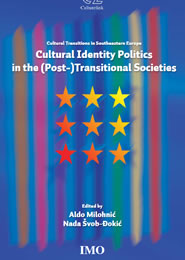Critical analysis of re-definition and re-construction of cultural identities in SEE, through different social and cultural apparatuses and in the context of "EU-ropeanization", regionalization and globalization processes, opens an important research question: do these processes (significantly) influence possible re-definition and re-construction of cultural identities in the direction of ethnically and nationally non-exclusivist cultures?
The project consortium which consisted of researchers from an 'old' EU member country (Austria), a 'new' member (Slovenia), a candidate country (Croatia), and a country with aspiration to become EU member (Serbia) has assessed the situation in the countries with structurally different positions as far as EU membership is concerned.
Our research interests were directed towards analysis of different social and cultural domains and apparatuses affecting re-construction of cultural identities in the process of "EU- ropeanization" of SEE countries, such as: politics of memory; language politics on the example of national minorities; traditional media, such as national theatres, new media, mass- media, popular culture and cultural industries; cultural production etc.
To this end, we have:
- prepared numerous analyses (see the section Research studies), as well as exchanged already accumulated knowledge on the topic (see the section Working papers);
- discussed problems and research questions among members of the project team, guest experts and postgraduate students (see the section Conference);
- presented and disseminated results of the project by publishing them in the book Cultural Identity Politics in the (Post-)Transitional Societies (see the section Research studies or visit the Culturelink website where you can download a free PDF version of the book).
First activities started in May 2010 and the project reached its end in April 2011.

